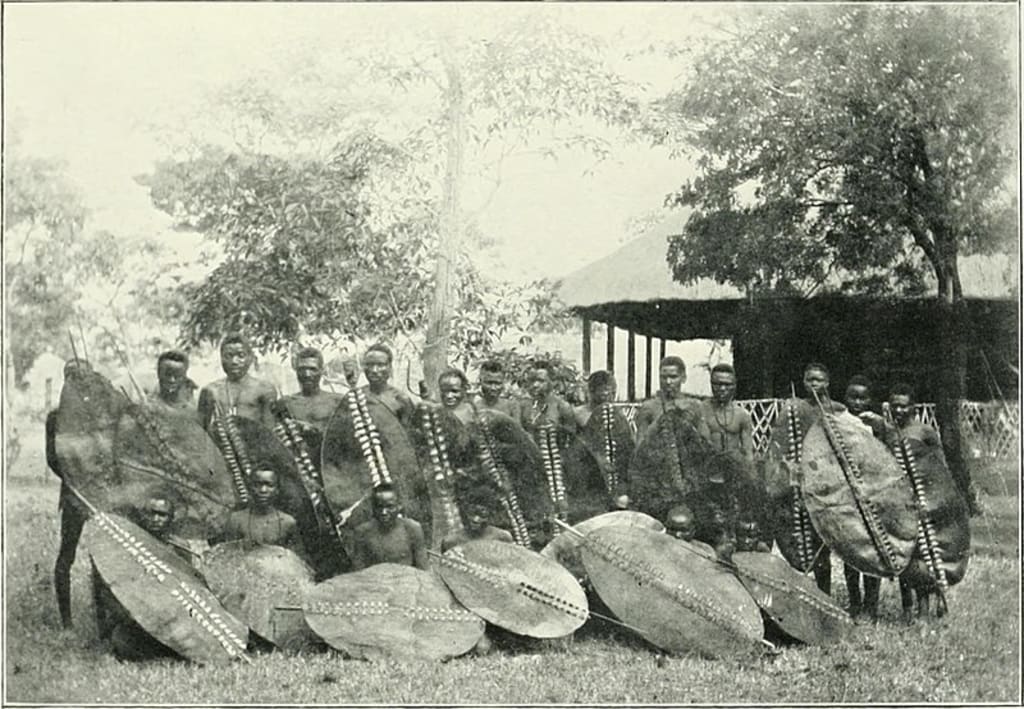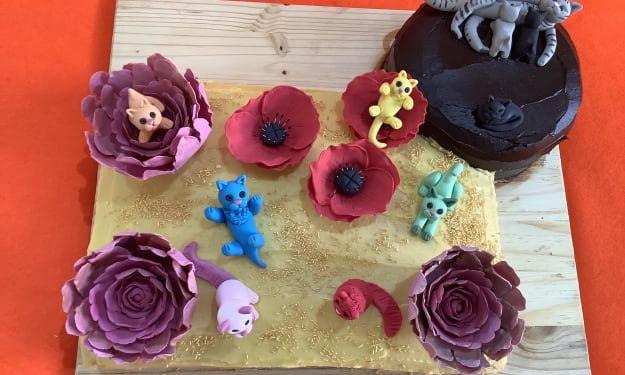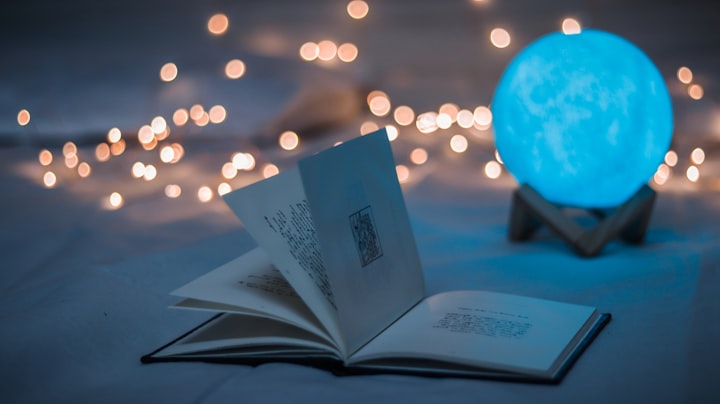Magic mirrors and dancing lights
Broken mirror

The mirror showed a reflection that wasn’t my own. My face was an alien landscape of fluid-filled blisters, each with a dent in the centre. The pustules were layered, one on top of another giving my normally wrinkled brown skin the hideous look of mud trampled into erratic pieces by desperate animals at the height of a drought.
The bumps covered every inch of my skin, flowing down my neck and covering my torso, arms, and legs like lava. I was a monster.
Many others in the tribe are suffering from the same affliction which started with high fevers, headaches, backaches, vomiting, and diarrhoea. It had affected numerous warriors who now lay dying in their huts.
When the disease first struck, the traditional healers, consulted the ancestral spirits to determine the cause of the bad luck. A ceremony was held to pay homage to the ancestral spirits and offerings of food and drink were presented.
Now, the bones thrown by the healers lie scattered in the dust. They too have succumbed to the disease.
After some reflection, King Soshangane asked me, Vangama the Old, to consult the magic mirror. The hazy impressions of the future he saw, caused him to understand that he had angered the ancestors.
“The ancestors wish me to return to Bileni. They showed their favour by facilitating the defeat of the great Shaka, King of the Zulus. More good luck followed with the defeat of the white men who now pay tribute to me. The ancestors gifted me the fertile lowlands of the Lower Limpopo River and they now wish me to return there.”
Why he needed the mirror to confirm the anger of the ancestors was beyond my comprehension. The dancing lights and hearths of the ancient ones which had been part of our lives since we’d left our traditional home at eTshaneni or Ghost Mountain, had not followed us here. We had not seen them shining and shimmering during the night since we left Bileni four springs ago.
Now, finally, the King and his remaining followers are readying themselves for the return journey. His son, Mzila, will remain here with the goal of placing the area north of the Zambezi River under his control. His father was determined to keep expanding the vast empire which he had named the Gaza Empire for his grandfather.
The Limpopo valley is so beautiful. I long to return, but it is my destiny to die here and be buried in a mass grave with the rest of the afflicted.
Standing in my hut, the mirror in my trembling right hand, I reflected on my situation and how it had come to pass.
***
I am a diviner, just like my mother and grandmother before me, and I am also the bearer of the magic mirror that foretells the future.
The mirror was gifted to me by the first white man the tribe came across. An older man with sparce greying hair and a sharp nose.
“Cap – tain Will – i – am O – wen,” the strange name rolled awkwardly off my tongue as I said it aloud.
The white man was peaceful and Chief Soshangane did not see him and his assistants as threats, even though they had sticks that that could kill an antelope with just noise. Captain Owen gained us some fresh meat with his magic stick. We were all hungry and it was most welcome, but the noise was awful. So sudden and loud. I prefer our men’s method of hunting with a silent assegai.
Captain Owen was travelling along the Tembe River, drawing strange pictures of the countryside onto parchment which he kept rolled up into long tubes. He showed me some of his pictures. They made no sense to me, but I was happy he was pleased with them.
Those were bad days for my people. We had fled our traditional home beneath Ghost Mountain, leaving undefended, the tomb cave where generations of our chiefs are buried.
We had no option but to flee when King Zwide, the leader of the greater Ndwandwe people and the brother of Chief Soshangane, suffered a resounding defeat against the Zulu warriors lead by their young general, Shaka.
King Zwide had reached the peak of his power at the same time as King Dingiswayo of the neighbouring and rival Zulu people. As was to be expected, war broke out between the two tribes. Having managed to ambush and kill King Dingiswayo, King Zwide gained a short-term victory over the Zulus.
After the death of King Dingiswayo, King Zwide thought Shaka would pledge his alliance to him and the Ndwandwe people, but he did not. Several months later a Zulu force, expanded to include the neighbouring chiefdoms and led by Shaka, defeated King Zwide in a savage battle on the banks of the Mhlathuzi River.
“Shaka is as cunning as a hyena,” Chief Soshangane told his warriors after the deciding battle was fought. “The great river runs with the blood of Ndwande warriors. King Zwide’s heir, Nomahlanjana, is dead, as well as four of his other sons. The King has fled with his surviving family. We must also flee or face the wrath of the Zulus.”
Chief Soshangane had to choose between leaving his family land at Ghost Mountain or being absorbed into the Zulu tribe. He chose to leave, and he persuaded his four brothers to flee with him.
The journey along the eastern foothills of Lubombo was hard. The Khosa and Vankuna people feared the rage of the Zulus and refused provide us with any food or assistance. It was to their detriment as Chief Soshangane did not forget and sought revenge on them later in his life.
The flickering fires and restless lights of the dead chiefs accompanied us. The dancing lights were familiar and comforting. All our lives they had shimmered across the face of the cliffs of Ghost Mountain at night, lighting up its crevices and caverns and reminding us that our ancestors were present.
The shivering lights frightened Captain Owen. I remember the look of shocked horror on his white face when he first saw them. I laughed inside. I am sure my face held the same look when he used his magic stick.
Captain Owen did not understand the lights’ purpose in guiding us to a place of safety. It fell to me to tell him the history of our ancestral burial ground on Ghost Mountain.
The teenage boys had cut the meat off the antelope and strung it on sticks. The meat sizzled and cooked over the fires, filling the air with a delicious, pungent smell. While we waited in eager anticipation of our meal, I told the story of the dancing lights.
“The Great Chief Gaza, grandfather to Chief Soshangane, was a legendary leader of men. Before he died, he selected Ghost Mountain as his burial ground. After his death, the diviners, one of which was my grandmother, mummified his body and wrapped it in the skin of a black bull. It was then carried up the mountain and buried in a secret cave.”
“Where is the cave exactly?” the white man asked.
“Only diviners know the exact whereabouts of the entrance to the cave,” I replied evasively, forbidden as I was from disclosing this information. “It is now a tradition for our chiefs to be buried in the cave. The ancestors make their presence known through the shimmering lights you have seen.”
Captain Owen was delighted by my story. He presented the mirror to me as a token of his appreciation.
I was overcome by the magic of the mirror. In its shining waters I could see myself reflected as if I was looking into the stillness of the watering hole on a hot day. I turned it over and around, but the water did not run out. Chief Soshangane and each of his brothers examined it, using its mahogany handle to turn it over, and over again. Somehow, the water was trapped inside the wooden frame.
“Be careful not to drop the mirror,” Captain Owen cautioned. “It will break into a hundred pieces if you do.” He handed me a cloth. “Keep it wrapped up in this cloth when you aren’t using it.”
It was some days after our meeting with the white man, when I unwrapped the mirror again and stared into its calm waters.
As I watched, its gleaming surface clouded over. White mist swirled, obscuring my aged face, and gradually a picture formed. The picture started to move ...
Chief Soshangane was leading the warriors into battle. The Tembe River flowed peacefully behind the small village where a scene of carnage was unfolding. The leader of the village lay bleeding in the dust, hacked to pieces by our fighters. Leaderless, the men of the village capitulated immediately. The young men and women were taken captive, I saw them being led away by a contingent of our warriors. The older adults were quickly dispatched, their bodies left for the jackals and other scavengers.
I shared this prediction of the future with Chief Soshangane, who accepted it solemnly as a good omen.
Over the next seven years, our warriors defeated almost all the Ronga clans in the vast area ranging from the Tembe River and continuing in a north-westerly direction right up to a tributary of the Nkomati River. Their cattle increased Chief Soshangane’s wealth, their young men swelled his army, and their young women ensured a healthy line of succession.
In addition, numerous Ndwande refugees, the remnants of King Zwide’s people who had again been decimated through continuing military engagements with the Zulus, reinforced our numbers.
At night-time, the ghostly fires and lights of the ancestors shimmered and danced as the past acknowledged the present.
Success shone brightly and Chief Soshangane waxed rich and powerful. His confidence grew as his dream of a Nguni empire built from the conquests of other tribes took shape. He continued to expand the Gaza Empire and basked in the warm glow of the nightly reinforcement of the ancestors’ support.
Occasionally, I would be requested to consult the magic mirror and ensure that its power continued to remain behind Chief Soshangane and the Gaza Empire. It always did.
The growing power of Chief Soshangane, who was now a king, attracted the attention of Shaka who had also assumed the title of King of the Zulus. Shaka decided to deal with his rival in the north once and for all.
***
“The Zulus are coming,” the scout said. “They will be here tomorrow morning.”
The midday sun beat down on the man’s bare head and chest. Trickles of sweat ran down his cheeks and dripped onto his shoulders. Beads of sweat decorated his chest, which rose and fell slowly and evenly despite his recent exertion, running non-stop for several miles to deliver the news timeously.
King Soshangane dismissed the scout and swiftly moved into action. Summonsing his chiefs, he ordered them to prepare their regiments for battle against the Zulus. Additional scouts were sent out to monitor the approach of the rival army and messengers arrived and left constantly all afternoon, delivering updates to the war counsel.
The evening arrived quickly. Standing with the diviners, healers, and war counsel at the top of the rise above the valley, a position chosen for its ease of defence, I watched the sinking sun paint thick bands of pink, purple, orange, and red across the canvas of the sky. With a swiftness unique to southern Africa, the sun gathered up its vibrant artwork and dropped behind the horizon, leaving the world in near darkness.
The dancing lights of the ancestors appeared, more and more of them until their combined light bathed the hillside and the beautiful expanse of the Limpopo Valley below in a soft yellow glow, that blended the surrounding hills into undefined and blurry shapes, and plunged the shadows and gorges of the lower Limpopo valley into velvety blackness.
Exhausted by the activities of the day, the warriors, soon lay down to sleep. Many of these young men originated from the local Tsonga and Shona peoples who had been subjugated by King Soshangane and incorporated into his army. Trained in the fighting methods of the Ndwande, they lay ready for battle in their chest and back coverings, and headbands made of impala skin and ostrich feathers. The shimmering lights flickered over their spears and turned their sleeping faces into ghastly skulls.
Lying down on my sleeping mat near the hearth, thoughts of these brave young warriors filled my mind and I how many of them would still be alive the following evening.
The sky was bruised dark purple, and the air held the cold crispness of pre-dawn when I awoke the following morning. Negotiating my way around the sleeping bodies as quietly as possible, I hurried to meet the King at a pre-determined spot. He wished me to consult the mirror in advance of the battle.
Carefully unwrapping the mirror, I gazed into its silvery waters. Its surface rippled and reformed to display figures fleeing in chaotic disorder. Next to me King Soshangane gasped. It looked like a routing.
“It’s not us, my King,” I said softly, pointing at the shining surface. “It’s the Zulus who are running.”
A great sigh whistled between the older man’s teeth. I noticed how whitely they gleamed in the first rays of the morning sun. “Yes,” he agreed, “It is the Zulus who are withdrawing.”
The clash that came later that day was a disappointment. After all the careful preparations and anxiety, the Zulu army that arrived under Shaka’s brother and half-brother, Mhlangana and Dingane, was depleted, weak from hunger and fever and ague. Many warriors had fallen behind the travelling army, too sick to even stand. They had been left behind to die where they fell.
“You are to fight to the death. Fight until you are wiped out,” King Soshangane had delivered his orders to the chiefs.
The army had assembled ready to carry out these orders, but the battle against the feared Zulus did not prove to be as desperate as expected. When our seasoned warriors clashed with their opponents in the valley, a great roar of shields meeting rose like thunder.
The war counsel and women watching from the rise drew in a collective breath of expectation as the two rows of struggling, heaving humanity struggled, but the Zulu line soon thinned and our warriors surged over them like a great wave, stabbing and killing.
The remains of the attacking army turned and ran, their ostrich feather head dresses streaming behind them. King Soshangane was the victor and only a couple of hundred of our men lay dead or dying in the grass.
After this tremendous victory, there was no stopping King Shoshangane who was determined to continue to expand the Gaza Empire. He overran the settlements of the white men at Delagoa Bag, Inhambane and Sena and forced them to pay tribute to him.
As is the way of great men, the King became arrogant and decided to go ahead with certain plans despite the clear lack of support from the ancestors.
But the ancestors are peevish and easily offended if they do not receive appropriate homage. They struck down the King’s army with this foul disease, forcing him to capitulate to their preferences.
I also rank among the collateral damage.
A rustling at the door of my tent brought my attention back to the mirror in my hand.
“Vangama,” a soft voice called. My young great-granddaughter slipped through the entrance and stood before me.
I sent up a silent prayer that she remained untouched by this terrible disease.
“King Soshangane sent me to get your magic mirror,” she said. Her dark eyes were large and luminous.
“Did he really?” I asked. My anger must have shown in my voice as she looked at me.
“Why does he want it? Will he give it back when you are well?” she asked.
Poor innocent lamb, she doesn’t realise that this is the end for me. “The King hasn’t come near me since the lesions first appeared and now he has sent my sweet Nandi to take my mirror. Risking her life!
My blood boiled in my veins. I felt it surging around my body and slamming through my heart and brain.
Looking down, I saw the mist over the mirror's waters was swirling. I saw the King's warriors selling captive men and women from local tribes to work for life on the plantations of the white men. I saw these slaves being abused and mistreated by their masters.
I gasped with outrage. How could he do this to our own people?
A huge surge of pain crashed through my heart. I doubled over, the mirror falling from my claw like hands.
SMASH! It hit the compact mud floor and shattered into hundreds of gleaming pieces.
I fell on my side, the sharp spears piercing my left arm, side, and leg and lacerating my face. I opened my mouth to scream but only a last gusty breath came out.
I shuddered violently, closed my eyes, and set off on my journey to join the ancestors.
About the Creator
Robbie Cheadle
Robbie Cheadle loves to create in a variety of mediums including words, cake, fondant, charcoal, and oil pastels. She enjoys writing fantasy stories for children, poetry, and paranormal stories for adults in historical settings.






Comments (4)
Such a powerful read, Robbie! Love it 💕🙂
very nice
This was a great story. It show how greed changes people.
Exciting, and powerful story. It was a pleasure to read.